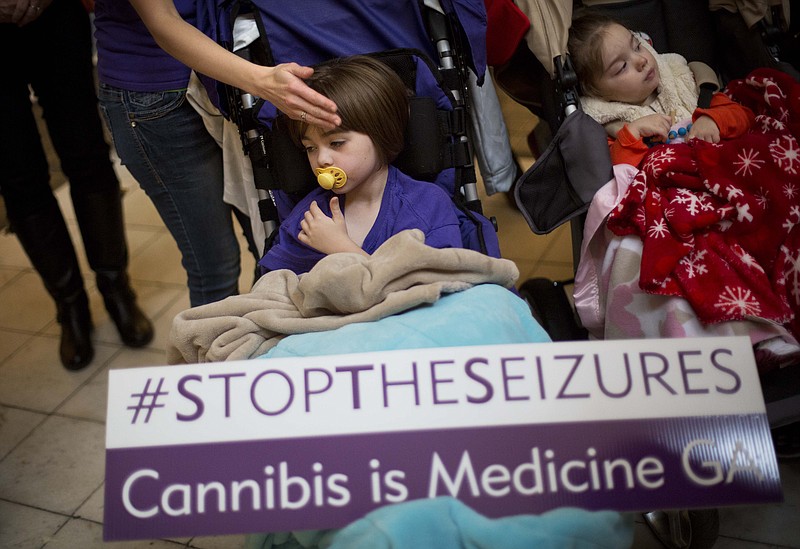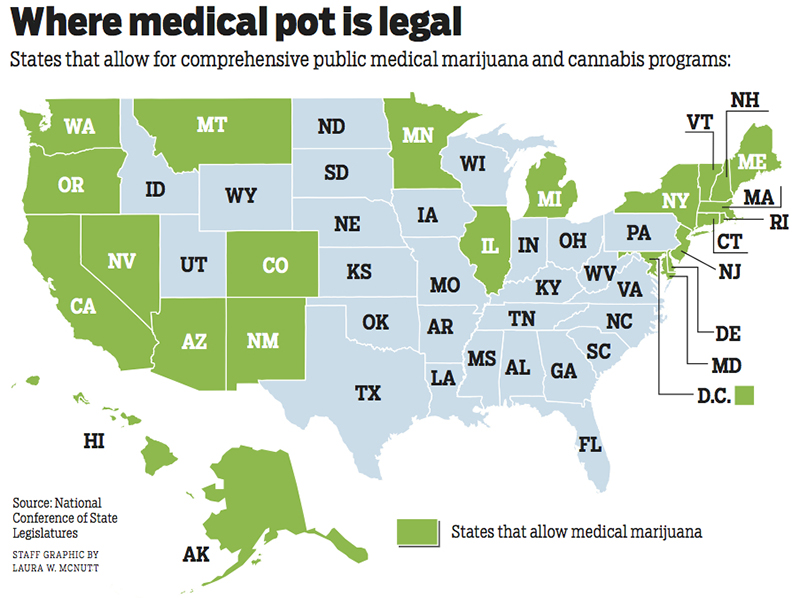Read more
Pediatricians group: Medical pot only OK for sick kids failed by other drugs
Gib Jones sees a green-tinted future. To get there, though, he needs help from the Georgia Legislature.
Jones and his family grow tomatoes, lettuce and basil in Chickamauga, Ga. They sell their plants and herbs to local restaurants. They do fine, he said. But they can do better.
They just have to change their product.
First, however, that product has to become legal. So Jones has followed the debate about medical marijuana in Georgia the last two years, waiting to see if and when his elected officials will decriminalize the drug.
Sure, marijuana's use would be restricted at first. If passed this legislative session, House Bill 1 would only allow those in need -- specifically children with epilepsy -- to use cannabis oil. It eases seizures but doesn't contain THC, the intoxicating agent in marijuana.
But Jones sees the bill as the first concrete step toward wholesale legalization, which could lead to a promising business.
Jones, 30, who said he has never grown the drug and hasn't used it in more than 10 years, thinks he can squeeze 2,000-3,000 marijuana plants in the family greenhouse.
"Believe me," he said, "it would make more money than lettuce."
Local conservative lawmakers don't see HB 1 the same way Jones does. They support it, but the politicians caution that they will not stand for a slippery slope toward legalization. They say this bill, considered weak among marijuana advocates, will not lead to an army of bathing-averse, long-haired, sidewalk-loitering slackers wasting their afternoons with funny pot cigarettes. No, sir.
Jones thinks those opinions will change with time. His elected officials just have to consider the economics. Last year, Colorado's Joint Budget Committee projected that the state took in $184 million in tax revenue on marijuana through its first 18 months of legalization.
"Politicians and money go hand in hand," he said.
Already one of the most talked-about bills this legislative session, HB 1 will be on the forefront in Georgia at 1 p.m. today when its sponsor, Rep. Allen Peake, R-Macon, holds a news conference to discuss changes he has made to the legislation.
Peake has said cannabis oil is an important medicine for children who suffer continuous seizures. It provides a necessary reprieve.
But he announced plans earlier this month to tweak the bill following discussions with Gov. Nathan Deal. If passed, the bill would still allow people with illnesses to use cannabis oil. But it won't let people grow their own marijuana to get the oil.
The bill is expected to also create a study committee of medical experts who, at the end of the year, will recommend to the Legislature how they could regulate marijuana growth in the future. Peake is optimistic that state lawmakers will make marijuana growth legal during the 2016 session.
A similar bill almost passed the Legislature last year. With two hours left in the 2014 session, the House voted 168-2 to approve the plan. But the bill never went to the floor for a vote in the Senate.
Marijuana advocates are frustrated with Peake's revisions of HB 1. They say the bill actually encourages illegal activity. Georgians can't grow marijuana for cannabis oil, and it's a federal crime to transport the oil across state lines.
But Peake said Georgia leaders can solve that problem. And, with Deal's blessing, Peake's bill has drawn support from Republicans, including those in the northwest part of the state.
"It's not a slippery slope to legalize marijuana or anything like that," said Rep. John Deffenbaugh, R-Lookout Mountain. "It has specific uses for specific needs with specific applications."
Rep. Steve Tarvin, R-Chickamauga, said he "support[s] it 1,000 percent."
Said Sen. Jeff Mullis, R-Chickamauga: "I believe it will pass this legislative session. But it will be controlled. We don't want to be Colorado in the state of Georgia."
But if the bill passes this year, how will families actually get the cannabis oil? Peake offered some solutions in an editorial for The Atlanta Journal-Constitution.
He said an unnamed cannabis oil manufacturer in another state has already agreed to ship a product to Georgia that is so low in THC that it is considered hemp. The federal government allows people to ship hemp across state lines.
If the company can't provide the families with the oil, Peake said, South Carolina is developing a product that is also low enough in THC to be considered hemp. Families could travel one state east to buy their medicine.
And if that doesn't work, Peake said, he will ask Deal to request an exemption from the Drug Enforcement Administration and the U.S. Justice Department. This exemption would allow people to ship cannabis oil to a Georgia state agency, which would give it to families in need.
If none of those plans work, Peake promised to transport the cannabis oil himself, breaking the law.
"I am fully prepared to risk going to jail to get medicine for these children with seizure disorders," he wrote.
For certain advocacy groups, Peake's promises of civil disobedience don't make up for what they consider a weak law.
James Bell, director of the Georgia Campaign for Access, Reform & Education, said Peake should have held his ground and pushed for marijuana growth.
"He basically rolled over," Bell said. "I don't know why. I guess you would have to ask Allen. Politics is politics."
Peake's new solutions are convoluted, Bell said. Allowing marijuana to be grown locally is a simpler plan.
Local lawmakers disagree. Deffenbaugh argued that the state won't be able to regulate individuals who grow the drug. How will government officials keep track of what they do with it?
"Who's going to extract [the cannabis oil]?" he asked. "How is it going to be extracted? What's the concentration of it? How is it going to be used? If you start growing marijuana, you can use the other parts of the plant for its high."
And while the Legislature may create a study committee to discuss marijuana growth in the future, Bell pointed out that it already formed one study committee last year. The group met five times but never made any recommendations.
Like Jones, the prospective grower in Chickamauga, Bell believes marijuana use will eventually be as legal as alcohol in Georgia. But that will take time. And in between, he said, state leaders will stall.
He predicts a new committee will form this year. Then the Legislature will have to make its own decision. Again.
"We've missed another year," he said. "Come next year, there's going to be another reason, another excuse for why Gov. Deal doesn't want to implement growing cannabis in the state of Georgia."
Contact staff writer Tyler Jett at tjett@timesfreepress.com or 423-757-6476.

